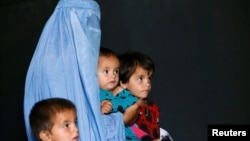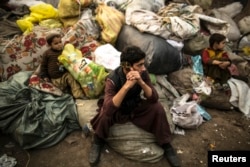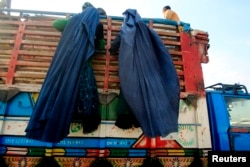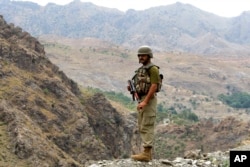The United Nations says around 370,000 registered and undocumented Afghan refugees have returned home from neighboring Pakistan this year, with a significant spike seen since mid-July.
The U.N. Office for the Coordination of Humanitarian Affairs (OCHA) in Kabul issued the figures Sunday, saying nearly 52,000 Afghans crossed the border into Afghanistan last week alone, the highest single figure recorded in a seven-day period since 2009.
Tougher conditions
It stated that the spike in the number of returnees stems from “continued pressure by Pakistani authorities through new visa requirements, shorter extension of proof of registration cards, increased police raids, detentions and deportations, restricted access to livelihoods, health-care and education as well as lack of employment opportunities.”
“In the past week, an average of 5,200 registered refugees and 2,160 undocumented returnees have crossed the border into Afghanistan from Pakistan each day. Based on current trends, a further 446,000 (both registered and undocumented) are expected to arrive before year-end,” according to the OCHA.
It says that UNHCR - with the help of local authorities and partner aid agencies — is providing support to both caseloads amid significant resources shortages.
“Aid agencies are in a race against time to provide this assistance before the arrival of the wet and winter seasons in November,” warned OCHA.
UNHCR officials in Pakistan acknowledge the exodus of registered Afghan refugees is “largely voluntary." They also note that the refugee agency’s decision to double the cash grant for voluntary returnees from $200 to $400 per person in mid-June, and a newly-launched campaign by the Afghan government to encourage the displaced families to return to Afghanistan and take part in the nation-building are among major contributing factors for the unusual rise in the number of Afghans choosing repatriation.
Pakistan hosts around 1.5 million registered Afghan refugees while another at least one million are living illegally. Most of the displaced families have fled decades of Afghan hostilities.
Border security measures
Pakistani authorities defend stepped-up border security measures and strict monitoring of refugees’ movements, saying anti-state militants use them for hiding and plotting terrorist attacks on both sides of the border.
Critics, however, say pressures on Afghan refugees stem from tensions in relations between Islamabad and Kabul over each country's allegations of sponsoring terrorism against the other.
The rise and spread of Taliban-led insurgency across many Afghan provinces since the withdrawal of U.S.-led international combat troops in 2014 had until now significantly slowed the UNHCR-funded voluntary repatriation of Afghans from Pakistan and Iran.
The United Nations recently launched a flash appeal of $150 million to meet urgent needs of more than one million Afghans it estimates will be on the move in Afghanistan by the end of 2016 because of continued displacements by the war and the unusually high number of refugees returning home.







